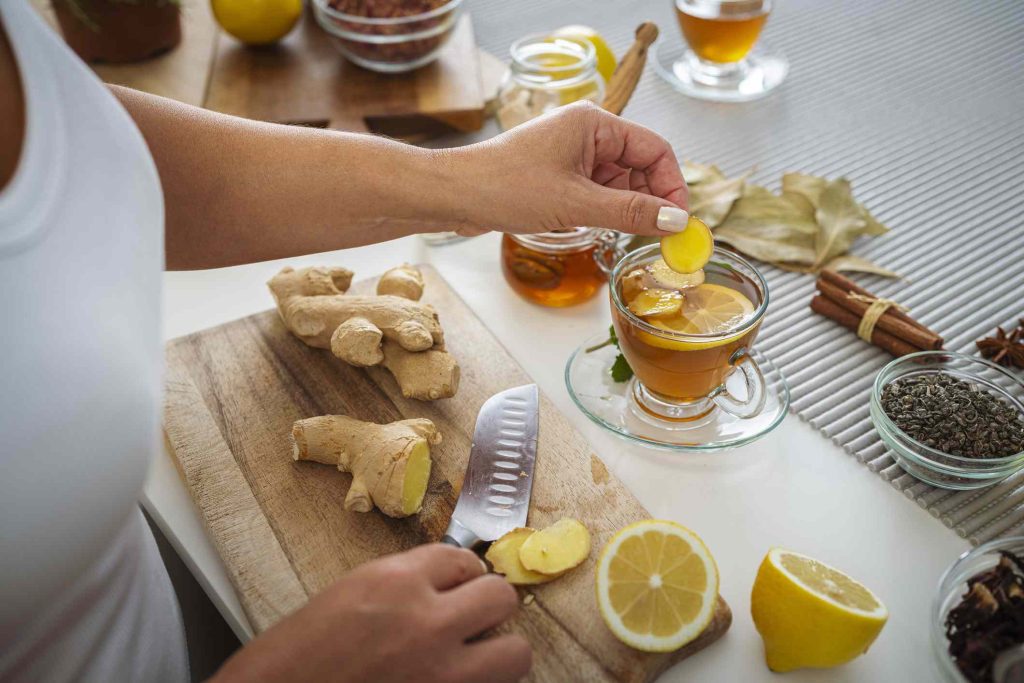:max_bytes(150000):strip_icc():format(jpeg)/Health-GettyImages-1778620460-44d0848c004d43aa9d294659979187b2.jpg)
Ginger root (Zingiber officinale) belongs to the same plant family as cardamom and turmeric. In cooking, you might peel and grate the root for stir-fries or use nickel-sized slices to add fragrance to a stew.
Ginger is also valued for its anti-inflammatory and healing properties. It contains over 100 beneficial bioactive components. It’s also very high in antioxidants, which neutralize harmful molecules to prevent cell damage and disease.
Since ancient times, ginger has been used as a remedy for colds, sore throats, muscle aches, and various other ailments. It is commonly used as a natural remedy for nausea and stomach upset.
Ginger may help maintain healthy cholesterol levels. A research review found that consuming 2 grams or less of ginger daily can significantly lower total cholesterol and certain lipids (fat that circulates in the blood), such as triacylglycerol (TAG).
While several human studies have shown ginger can help reduce low-density lipoprotein (LDL, or “bad”) cholesterol, total cholesterol, and lipid levels, more research is needed before ginger can be recommended as a standard treatment.
Ginger is considered safe and has little to no side effects when taken in smaller doses, like 2 grams or less. It’s also a readily available and inexpensive option for managing cholesterol levels.
Ginger is widely known for its soothing effects on the stomach. Taking 1.5 grams of ginger may settle a queasy stomach. Several studies have shown that as little as 1 gram of ginger per day can effectively reduce pregnancy-related nausea and vomiting.
Ginger may also help manage gastroesophageal reflux disease (GERD). Ginger can ease stomach pressure by reducing gas and bloating, which might otherwise cause the lower esophageal sphincter (LES) to open. When the LES relaxes or opens, it can allow stomach acid to travel into the esophagus and trigger acid reflux.
A clinical trial involving people with functional dyspepsia (recurring stomach pain without a clear medical cause) found that a supplement combining ginger and artichoke extract helped reduce symptoms. Researchers stated that ginger targeted the stomach while the artichoke targeted the small intestine.
When taken before lunch and dinner, the supplement significantly improved nausea, stomach pain, gas, and bloating compared to a placebo.
Standard treatments for migraines often include nonsteroidal anti-inflammatory drugs (NSAIDs) and other medications. Researchers have explored using ginger extract as a complementary treatment to further improve migraine relief.
In a clinical study with 60 people who had an acute migraine during the trial, all participants received an intravenous (IV) infusion of 100 milligrams of ketoprofen (an NSAID). Some participants also received 400 milligrams of ginger, containing 20 milligrams (5%) of its active compound, gingerol.
The people who had the additional ginger treatment showed significantly better outcomes than those given an additional placebo treatment. The ginger group reported reduced pain and improved ability to function compared to the placebo group.
About 240 million people worldwide suffer from osteoarthritis (OA), a painful, inflammatory condition often associated with aging. While NSAIDs can help manage osteoarthritis, long-term use can come with potential side effects.
Research suggests that ginger’s anti-inflammatory properties make it useful as a co-treatment to reduce local inflammation in OA. Expert organizations also recognize ginger’s potential for managing symptoms of this condition.
Ginger contains compounds that can provide antioxidant support. These include gingerols, shogaols, and zingerones. Their health-protective properties have several benefits, including relief from menstrual pain.
These compounds help by relaxing muscular spasms that often occur before and during menstruation. The compound shogaols may also reduce pain when used over time. Plus, ginger has gas-relieving properties that may reduce nausea and indigestion that often accompany hormonal shifts during menstruation.
Ginger may help reduce blood pressure by inhibiting the body’s angiotensin-converting enzyme (ACE), which plays a role in developing hypertension (high blood pressure). Ginger may also support healthy blood flow by reducing platelet aggregation (the clumping of blood cells that can constrict blood flow, leading to blood clots). However, research on the latter is inconclusive.
Several studies suggest that doses of 3 grams or more of ginger per day may effectively reduce both systolic (the top value in a blood pressure reading) and diastolic (the lower value) blood pressure in adults aged 50 and younger with diabetes.
While ginger has been used as a complementary treatment alongside high blood pressure medications, further research is necessary to confirm its effectiveness.
Ginger’s fragrant, spicy components—such as gingerols, shogaols, and zingerones—have blood sugar-lowering properties. Researchers have studied ginger for its anti-diabetic effects.
A study involving 45 adults aged 30-60 with type 2 diabetes examined the effects of taking a daily 2,000-milligram ginger supplement over 10 weeks alongside the participants’ usual medical treatment. Results showed that those who took the ginger supplement had significant reductions in both fasting blood sugar levels and HbA1c, a key marker of long-term blood sugar control.
Ginger may serve as an effective alternative to over-the-counter medications for relieving pain and inflammation after oral surgery.
In a study on people recovering from gum surgery, a dosage of 400 milligrams of ginger taken three times daily, over three days, was found to be just as effective as ibuprofen (a common NSAID, often under the brand name Advil) in reducing swelling and discomfort.
Ginger may be used alongside other herbs or plant extracts to treat a cough. Ginger contains compounds called polysaccharides that have natural anti-tussive (cough-suppressing) properties. For example, a combination of ginger and tangerine peel (which also contains polysaccharides) extracts can be an effective home remedy for coughs.
Ginger’s beneficial components (namely gingerols, shogaols, zingerones, and paradols) provide anti-inflammatory, antimicrobial, and antibacterial support. Microbes, including bacteria, can weaken a person’s immunity and contribute to the onset of a cold.
An itchy, sore throat may accompany a cough and cold. Sucking on a hard ginger candy may provide some soothing relief.
Allergic rhinitis, commonly known as seasonal allergies or hay fever, is a response to allergens such as pollen. Symptoms of hay fever include stuffy (inflamed) nasal passages, itchy throat, and watery eyes.
Research has shown ginger supplementation may be a potential alternative to medications such as Claritin (loratadine), an antihistamine. A small study treated one group of people with allergies with 500 milligrams of ginger extract over three to six weeks and another group with 10 milligrams of loratadine. Both groups saw similar improvements in nasal symptoms, including reduced pressure, and the ginger group had fewer side effects.
Ginger root may be consumed whole, minced, or crushed and can be used as a potent flavoring in cooking and an herbal remedy for colds. It may be used in herbal teas, found as a powder, or juiced to flavor beverages or smoothies. You may use one tablespoon of ground ginger or up to two-thirds cup of freshly grated ginger in your preparations.
Crystallized ginger candies are commonly used for sore throat relief. The amount of ginger in ginger chews and hard candies can vary.
Ginger supplements are conveniently available in powdered, capsuled, and other forms. A typical dosage is up to 1,000 milligrams (1 gram) of dried ginger extract per day. Consuming up to 4 grams of ginger root per day is considered safe.
Ginger is generally recognized as safe with no known side effects at moderate dosages (up to 4 grams per day). However, consuming too much may lead to side effects such as allergic reactions, digestive discomfort, and mood fluctuations.
Doses as high as 6 grams per day could worsen digestive issues like GERD and potentially contribute to the formation of gallstones due to increased bile acid production. In rare cases, high doses of ginger have also been linked to a rapid heart rate.
Potential Drug Interactions:
Some compounds in ginger may interact with certain medications, including:
- Warfarin and anti-platelet medications: Use ginger cautiously or avoid it when taking anticoagulants like Coumadin (warfarin) or anti-platelet medications. Ginger’s properties may enhance the effects of these medications, increasing the risk of bleeding.
- Diabetes medications: As ginger may lower blood sugar levels, people taking diabetes medications should be cautious about consuming ginger. The combination of ginger and blood-sugar-lowering medications may increase the risk of hypoglycemia (dangerously low blood sugar).
Ginger root is an aromatic herb commonly used to enhance the flavors of dishes. With its antioxidant, anti-inflammatory, and other soothing properties, it’s also used to reduce symptoms of cold, sore throat, and stomach discomfort.
Its anti-inflammatory and pain-relieving qualities make ginger a helpful adjunct therapy alongside conventional medications. It may relieve symptoms of osteoarthritis and reduce the intensity and duration of migraines.
Ginger is generally recognized as safe when used in moderate doses. However, high doses may cause side effects like stomach distress or potential allergic reactions. Exercise caution and consult your healthcare provider if you take blood thinners or blood sugar-lowering medications to avoid a potential drug-herb interaction.








